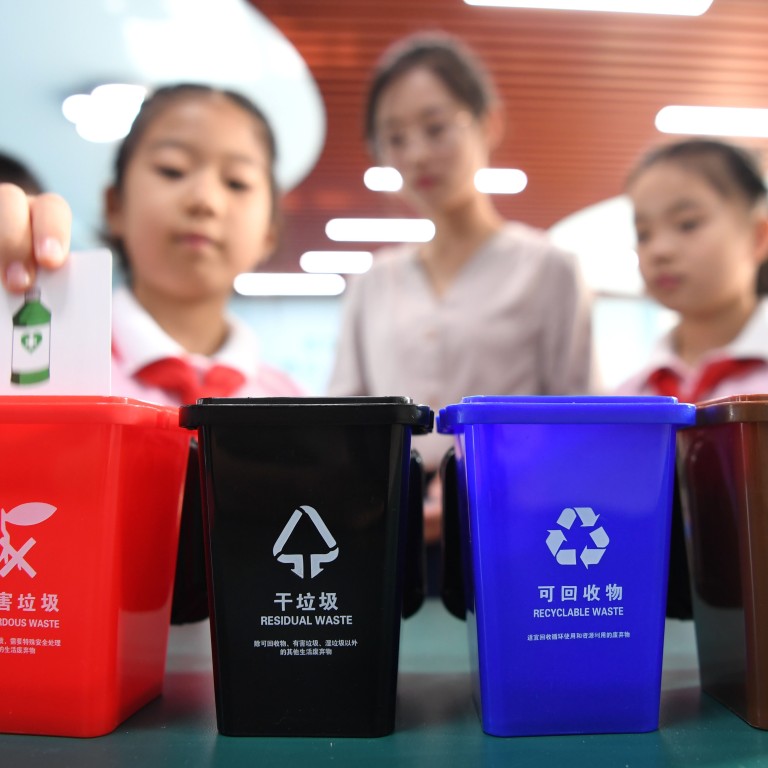
Shanghai’s war on waste leads to plastics surge
- Factories working day and night to meet demand for bags and bins under new rubbish-sorting rules
Several weeks after the launch of Shanghai’s much-applauded compulsory waste sorting initiative, the eco-friendly policy has seen a not-so-green result, with a surge in plastic consumption that has left manufacturers struggling to keep up.
Sales of plastic bags and bins designed for specific types of rubbish have soared, while manufacturers in China’s plastics producing hub, in neighbouring Zhejiang province, are working day and night to meet demand.
While some industry insiders see this as a short-term impact of the new waste policy, others expect it to last for some time, due to the central government’s intention to extend waste classification to more than 40 major cities across the country.
On Taobao, China’s biggest online shopping platform, 3 million household rubbish bins were sold last month – or more than one per second – according to its own data. The last week of June saw sales climb by half from the same period last year, it said. Taobao is owned by Alibaba Group, which also owns the South China Morning Post.
According to data published by JD.com, Taobao’s major rival, Shanghai sales of rubbish bins and bags between June 20 and June 30 on its platform rose by 105 times and 67 times, respectively from the same period last year.
In Taizhou, Zhejiang province, manufacturers have been operating at full capacity in what is normally their slack season. Alan Xu, a sales manager from Xinding Plastics, said the company had been extremely busy since late May as Shanghai prepared for the new rules, which took effect on July 1.
“The demand is so big that we don’t have the time and people to make enough products and deliver them,” he said. “Our Shanghai regional manager normally brings in orders of 3 million yuan (US$436,000) a month and, so far this month, it’s nearly 10 million yuan.”
Xu said the company had halted production of its other plastic items, such as dog kennels, for the moment to focus on rubbish bins, making 7,000 to 10,000 a day to meet demand.
But he expected the surge to be temporary. “Although 46 cities have been ordered to establish waste sorting systems, I don’t think many of them can really make it,” he said adding that, judging from past experience, not all city governments were as effective in carrying out policies as Shanghai.
Woman detained after choking volunteer over waste sorting in Shanghai
Chen Kejie, who runs a plastic bag factory in Cixi, also in Zhejiang, said orders for waste sorting bags had doubled since late June and he expected demand to continue for a long time.
“People used to put everything into one bag. With the introduction of the new rules they need to put them into different coloured bags – for example, blue for recyclables and black for hazardous waste – so they definitely need more bags,” he said.
Chen’s factory makes bags in different colours according to official guidance, as well as some with printed labels specifying which type of waste they are for.
“There were some orders for such bags before, but only from government agencies and the demand was low. Since May, it’s surged, generated by both government bodies and retailers,” he said. “After Shanghai, more cities are following suit as the central government pushes for waste sorting. So I think we will benefit from this campaign for a long time.”
Stumped by Shanghai’s recycling rules? There’s hundreds of apps for that
China is the world’s second largest rubbish producer, generating 210 million tonnes of municipal solid waste in 2017, according to the World Bank’s What a Waste database.
Previous attempts to tackle the problem by introducing waste sorting policies have failed, through a combination of people refusing to change their habits and a processing system that continued to mix different kinds of waste after collection.
In March last year Beijing set out plans for a standardised system with a target for 46 major cities, including Shanghai, to recycle 35 per cent of their waste by 2020.
Shanghai’s new rules are believed to be the strictest so far, pushing waste producers to separate their rubbish into four types – household food, followed by recyclable, hazardous and residual waste. Companies and organisations face fines of 50,000-500,000 yuan, while individual offenders risk a fine of 50-200 yuan, if they don’t comply.
The new rules have become a topic for national discussion in the past month and, for the first time, many people are changing their approach to waste.
Eric Liu, a Beijing-based senior toxics campaigner with Greenpeace East, said a rush on rubbish bins and waste sorting bags had been typical of previous pilot runs of waste collection systems in China.
“Too often in these new systems, officials just want to set up new bins with a fresh-printed sign and take a picture to show their bosses,” he said. “Of course it would be ideal if these new systems didn't trade one single-use plastic for another, but that change to reusable bags can be hard in the first step of a new system.”
Du Huanzheng, director of the Circular Economy Research Institute at Shanghai’s Tongji University, said the sudden surge in waste bag and bin purchases was largely a result of the city’s previous lack of environmental facilities.
“We know that, to ultimately solve the trash issue, we need to cut the production of waste in the first place. So more plastic consumption is not something we want to see, but I think it will drop when we install enough [facilities],” he said.
The installation of waste management facilities was part of China’s latest round of infrastructure building, Du said, comparing it to the country’s investment in motorways in the late 1990s and the construction of high-speed railway in the late 2000s.

